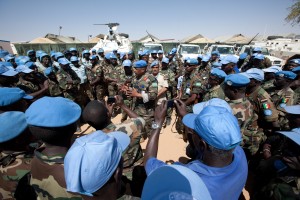The United Nations announced this week that 7 of its peacekeepers have been killed in an attack in the Darfur region of Sudan, with a further 17 injured.
Christopher Cycmanick, a spokesman for UNAMID, a joint African Union-United Nations mission, said the incident happened near the mission’s base at Manawashi, north of Nyala. It is believed to be the worst ever single attack on the mission.
A UN statement said all the dead were Tanzanian. UN Secretary General Ban Ki-moon condemned the attack and called on Sudan to investigate it fully.
Mr Cycmanick said the incident happened as the peacekeepers were on patrol about 25km (16 miles) west from a second UNAMID base at Khar Abeche, in South Darfur.
The patrol, made up of both police and military personnel, was moving between bases at the time, a distance of about 70km (44 miles).
Speaking to the BBC, Mr Cycmanick said that a large group of armed men had attacked the peacekeepers and there had been an intense exchange of gunfire. He said it was not yet known who the attackers were.
A UN statement said that the Secretary General was “outraged” to learn of the attack, adding that he “expects that the government of Sudan will take swift action to bring the perpetrators to justice.”
The UN estimates that more than 300,000 people have died in Darfur, mostly from disease, since rebels took up arms in 2003 against the Khartoum government. It further estimates that a total of 2,850,000 have been displaced, although the Sudanese government puts the figure at only around 450,000.
More than 16,000 UNAMID peacekeeping troops are currently based in the region.
Diplomats say the force, who have been operating in Darfur since 2007, are struggling with equipment problems, poor training of some contingents and the reluctance of some governments such as Egypt to send their soldiers into dangerous areas.
The force’s absence of a joint command has also been criticised, with concerns that this has hindered coordination and rapid deployment to conflict hot spots.











